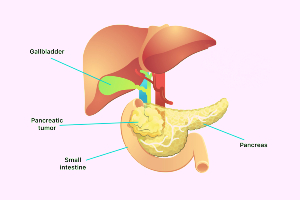Pancreatic Tumor Removal, Pancreatectomy, and Cancer Treatment in Bangalore
Pancreatic Tumor removal in Bangalore
A pancreatic tumor is an abnormal growth of cells in the pancreas, which is a gland located behind the stomach that plays a key role in digestion and regulating blood sugar levels.
There are several types of pancreatic tumors, including benign (non-cancerous) tumors, precancerous tumors, and malignant (cancerous) tumors. The most common type of pancreatic tumor is pancreatic ductal adenocarcinoma, which accounts for about 95% of all pancreatic cancers. Meet our expert doctors, get a consultation for Pancreatic Tumor removal in Bangalore.

Pancreatectomy in Bangalore:
Pancreatic cancer treatment in Bangalore
Understanding Pancreatic Cancer
Treatment Options for Pancreatic Cancer in Bangalore
Surgery
: Surgical procedures such as the Whipple procedure (pancreaticoduodenectomy), distal pancreatectomy, and total pancreatectomy aim to remove the tumor and surrounding tissues. Surgery is often considered when the cancer is detected at an early stage and is localized.
Chemotherapy
: Chemotherapy uses powerful drugs to kill or stop cancer cells from growing. It may be used before surgery (neoadjuvant therapy) to shrink tumors or after surgery (adjuvant therapy) to eliminate remaining cancer cells. Common chemotherapy drugs for pancreatic cancer include gemcitabine and FOLFIRINOX.
- Radiation Therapy: High-energy radiation is used to target and kill cancer cells. It can be combined with chemotherapy (chemoradiation) to enhance effectiveness. Radiation therapy is often recommended for patients who are not candidates for surgery.
- Targeted Therapy: Targeted drugs focus on specific genetic mutations or proteins in cancer cells, offering a more personalized treatment approach. Examples include erlotinib and larotrectinib.
Immunotherapy
: This treatment boosts the body’s immune system to fight cancer cells. Pembrolizumab is an example of an immunotherapy drug used in certain cases of pancreatic cancer.
Challenges in Treating Pancreatic Cancer:
Pancreatic tumors often grow and spread quickly, making them challenging to treat. They may not respond well to traditional cancer treatments, and symptoms often appear at advanced stages. As a result, the prognosis can be poor, particularly if the cancer has metastasized (spread to other parts of the body).
Advancements and Early Detection:
Despite the challenges, advances in treatment options and early detection methods are improving outcomes for some patients. Innovations such as minimally invasive surgery, precision medicine, and novel drug therapies offer new hope. Early detection through regular screenings and awareness of risk factors can also play a crucial role in improving survival rates
